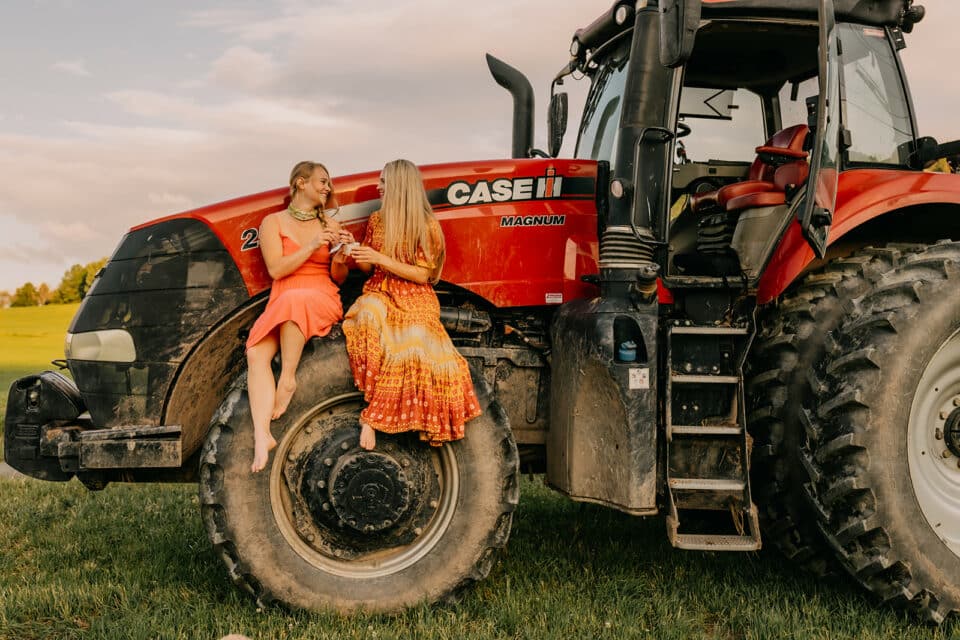Jodi Gauker has plenty of exciting things going on these days as marketing and sales coordinator for her family farm, Gauker Farms, and agriculture project manager for the Chester County Economic Development Council. I was eager to learn more about modern-day agriculture and all of the interesting roles Ms. Gauker plays within this important and continually expanding industry.
PA Eats: How did you get involved in the agriculture industry?
Jodi Gauker: I grew up in a rural area outside of Latrobe (home of Arnold Palmer, Rolling Rock beer and the banana split) surrounded by farms. My dad is a mechanic, so he spent a lot of his evenings and weekends helping the local farmers fix equipment and farm. So, naturally, I went with him and indirectly grew up “on the farm.” I had decided I wanted to work with the 4-H program when I grew up, and that’s what I set out to do. I studied animal science and earned my master’s in agricultural education. While at Penn State doing my undergrad, I met my now-husband. I said I’d never marry a farmer (because I really liked going on vacations!). That obviously didn’t work out for me, but I don’t think I’d change it.
Could you tell me a bit about Gauker Farms and what role you play in the day-to-day operations?
Gauker Farms is an 8th- and 9th-generation farm in Fleetwood, Berks County. My husband, Lee, is the 9th generation of the Schaeffer Family to farm that very same land (our definition of sustainability!), and the 10th generation is on the way. Gauker Farms was a crop and dairy farm for much of the 20th century. In December 2006, though, the family made the decision to sell the milking cows and continue crop farming. In about 2010, we missed having livestock on the farm, so we got some dairy steers that we fed the grain raised on our farm and sold at the livestock auction (where they would be bought by packers and go to a butcher for beef).
During our monthly family farm meeting in 2011, I mentioned that we should have our steers butchered and sell the beef directly. The family had never done that before, but I grew up buying a steer from the neighbors, or raising our own pigs on our one-acre, postage-stamp property bordering the corn or soybean field and having them butchered for our family’s meat supply. I also often shopped at local farmers’ markets because, well, I love food and can lose a day walking around food and people watching! So, in May 2013, we became licensed to sell frozen meat, and in August we started retailing our beef at the Artisan Exchange in West Chester.
Since then we’ve expanded to include the Downingtown and Malvern Farmers’ Markets. We’re at the AE and Malvern markets on the 1st and 3rd Saturdays, and the Downingtown market on the 2nd, 4th and 5th Saturdays.
My job is to do our ordering and marketing. I guess I’m the marketing and sales coordinator. I help Lee take the steers to the butcher in Mount Joy, Lancaster County, fill out our cut sheets, pick up steers when they’re ready and attend a market every Saturday. I trained Lee, his sister Mandy and his parents, Barry and Jackie, on how to operate at the farmers’ markets. I also manage our “on-farm store” that’s open by appointment, because all of us except Jackie have off-farm, full-time jobs.
How has farming evolved to become what it is today, i.e., what typifies “modern-day farming?”
“Modern-day farming” takes on all shapes and sizes. Honestly, there has never been a more exciting time to be involved in agriculture! I don’t think there is a typical farm any longer—except that at the root of it, most farms are still family-owned and operated like our own! There are so many people interested in where their food comes from, how it got to the market and their table and how it was raised. Everyone from the 800-cow dairy farm to the backyard produce-garden is raising safe, quality food locally for us to enjoy. That’s something to be proud of—not everyone in the U.S. can say that their milk and eggs are produced within a 100-mile radius of their home—and often closer than that!
Personally, I think there’s room in the market for any farmer that’s willing to work hard and provide a quality product. Sometimes, lately though, there’s a lot of negative energy spent talking about one type of production over another. The farmers I know are all trying to produce the best product they can using the resources (land, water, weather, tools, finances) available to them. I get to work with these farmers on the clock at my day job and call them colleagues off the clock. It’s pretty fun.
West Chester Artisan Exchange has many wonderful vendors, including Gauker Farms. What goods do you sell at the Artisan Exchange?
At Artisan Exchange, we sell our farm-raised frozen beef (ground beef, cubes, chipsteak, burgers, hot dogs, steaks, roasts, sweet bologna snack sticks and jerky) and pork raised by our friends’ four children at Younker’s Pride Farm, also in Berks County. It’s really fun to be at Artisan Exchange because so many of their products complement ours! If you haven’t tried Uncle Louie’s Sauce on our pork roasts or Gary’s hot sauce on our burgers, you’re missing out. For Memorial Day, we also put one of our burgers on a Waffatopia Maple Bacon waffle and it received some pretty rave reviews!
In addition to the work you do associated with your farm, I’ve learned that you are also the Agriculture Project Manager with the Chester County Economic Development Council (CCEDC). What are your daily responsibilities in this role, and how did you get involved with the CCEDC?
I got involved with CCEDC when I worked for Penn State Extension in my previous position. Grant funding from CCEDC (through the PA Department of Labor and Industry) helped fund one of our beginning-farmer programs we were holding in West Chester. I later learned the agriculture project manager position was available, and the grant I was working on with Extension was not refunded, so I had to find another job before the end of September (and I was getting married on August 11!). So, I interviewed in late July and started working for CCEDC one week after our honeymoon. It’s been an adventure ever since.
At CCEDC, I literally manage projects. I typically manage a lot of different grants that help fund the great work I do, connecting farmers with business resources, funding and training they need to grow their farm or agricultural business, and promote agriculture as a career option to students. We hold workshops for farmers and ag business owners so they can expand their business skills, and help fund trainings that help them learn best practices or new techniques and technology so that they can enhance their skills, and hopefully create more jobs within the industry. We also are able to access state and federal loan programs that many traditional banks do not have access to, which help finance farm and agricultural expansions, equipment, technology and other projects. I work with a TON of other great organizations, like my former employer, Penn State Extension, and others across the state to really provide a network of services to the farmers within our region.
You are quite busy and have plenty of projects in the works, one of which is a farming program for children. Could you tell me about this unique farming opportunity for kids?
Last year, we took 13 classrooms of students, just over 300 students, out of the classroom to farms and businesses so they could learn about the many different careers within and supporting agriculture. Showcases can include anything from behind-the-scenes tours of mushroom, dairy or beef farms to tours of the New Holland Agriculture plant in New Holland where they manufacture farm equipment, from the sheet-metal cut outs to the finished product! Students from the Technical College High School’s Brandywine Campus learned all about the New Bolton Center this past spring, and the work they do especially for horses. It’s really inspiring to see these farmers and agricultural entrepreneurs open their doors and show the passion they have for what they do each day for these students. We’re not still carrying buckets of water from the creek to water our gardens—agriculture is really a highly technical industry and there are so many more future opportunities for students than they realize—or even that exist today! AgConnect began in 2009, and since then we’ve reached about 3,800 students!
We also attended an agricultural career fair in Berks County, and helped fund the OA-BEST festival at Octorara Area High School in May.
We hope to continue those showcases in 2014–15!
What are three things you would like to see happen in the future when it comes to modern-day farming in the local area?
The best way to learn about agriculture is going directly to the source—the farmers. Ever wonder why one farmer chooses organic production, and one may choose conventional? Ask them! There’s a good chance that they have a better answer than you think they will.
I’d like to see the public embrace some of the technology that is allowing our farmers to diversify their businesses while feeding a growing population. The GPS technology used in tractors is allowing farmers to be more precise with their seed and spray placement, which increases yields. Although there is an abundant supply of some crops in the U.S. (and not others), we are exporting more to other countries that may not have the resources (weather, land or otherwise). Even our small-scale vegetable farmers are using more technology with greenhouses, cold storage and production methods (have you seen some of the trellis systems these creative farmers are building?!).
I’d also like to see more young people energized and excited to enter careers in agriculture. Agriculture careers do NOT just involve the trials of farming! There are a ton more careers in agriculture that SUPPORT the industry—think sales, marketing, chefs, distributors, educators and more. When you visit your favorite winery (mine are in the Lehigh Valley!) or microbrewery, do you think about how the person serving you your wine or beer is also involved in agriculture (They have to be educated in this agricultural product, or else there’s a good chance they won’t be selling much and earning their wages!)? All of these supporting careers are a critical part of our Commonwealth’s leading industry, and need to be recognized for their importance and the future possibilities these careers have in growing agriculture in the state.
How can the readers gain more insight into farming and lend a hand to help the local agriculture community?
The best way to gain more insight is to go to the source—the farmers. Buying local is a trend that’s not going away anytime soon. And thank goodness, because some of the highest-quality food and agricultural products in the nation are produced right here in our backyard! Visiting your local farmers’ market or on-farm stand is a great way to ask questions and learn. I have not met too many farmers who do not like to “talk farming.” They’re usually pretty proud and honored that you took the time to ask!
AgConnect is the board I work with at CCEDC. They provide valuable scholarships to farmers to attend trainings they need for their business, and also career-showcase opportunities for students to get them out of the classrooms and into the industry so they can learn about all of the exciting career possibilities there are in ag. We rely on grants and private donations to make these trainings and showcases happen. If you want to impact agriculture locally, beyond voting with your food dollars, donating to AgConnect will ensure these programs continue to help farmers in the region. Last year, we helped 343 employees receive the training they needed in topics like Good Agricultural Practices training, business planning and marketing, which will help them grow their businesses. In 2014–15, we hope to at least match that. Even the smallest contributions help.
We’re in the process of developing an online system of donating, but in the meantime, check donations can be made payable to the Chester County Economic Development Foundation with AgConnect in the note.
Find out more about Jodi Gauker and her many wonderful agriculture projects by visiting the Gauker Farms and CCEDC websites.
- First photo of Jodi Gauker: My 3 Girls Photography
- Farm photos: Gauker Farms
- Second photo of Jodi Gauker: Artisan Exchange




2 Comments